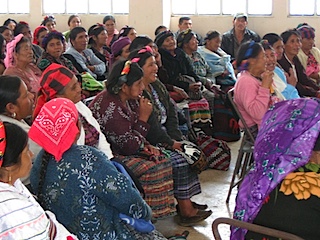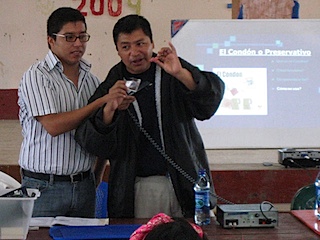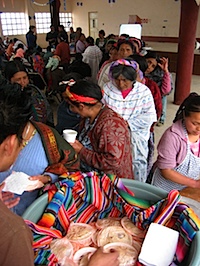
My friend Jerry used to say that the definition of “expert” is someone from out of town. Emily and I talk a lot about health topics, but it really helps people to believe things if they hear it from several different people. A few months back, Emily decided that we need to call in some experts of our own to talk about family planning.
We’ve mentioned it on the blog before, but family planning is a big issue in Guatemala. Rapidly rising population combined with a depressed economy and dwindling resources make the future look bleak. Luckly, there are other organizations besides the Peace Corps working in this area. One of them, ALAS, specializes in family palnning seminars for large groups. Emily met some of the leaders of ALAS several months back (their founder was one of the first Peace Corps volunteers ever in 1963), and asked for their help in our distant municipality.
At first, they were hesitant, because we are in a really remote, hard-to-get-to part of Guatemala. But after some discussion, it became apparent that this was a fantastic opportunity for them to reach a population who desperately needs the information, with the convenience of all the groundwork (introductions, advertisement, translation, etc.) done by someone already familiar with the community: us. A three-way arrangement between The Peace Corps, the Ministry of Health, and ALAS developed; this week ALAS sent their field trainer Luis to give a two-day family planning seminar to our midwive’s group.
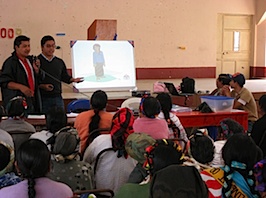 Luis was by the book, and did a great job getting the material across. He spent some time talking about how “family planning” and birth control methods are two completely different things, which is a message folks around here need to hear. Family planning simply means giving women (and men) the power to make their own informed decisions about how many children they want to have. As Americans, we often take this basic right for granted. Until very recently in Guatemala, this has not been the case. Religious pressures, social pressures, machismo, lack of self esteem, and general unavailability of birth control methods have made women slaves to having a dozen children or more. Add to that, a distrust of their own government. Some people believe that contraceptives are just another way to eradicate the indigenous population. The idea that they can CHOOSE to have fewer children (or chose to have just as many, if they want) is alien to them, and takes some getting used to.
Luis was by the book, and did a great job getting the material across. He spent some time talking about how “family planning” and birth control methods are two completely different things, which is a message folks around here need to hear. Family planning simply means giving women (and men) the power to make their own informed decisions about how many children they want to have. As Americans, we often take this basic right for granted. Until very recently in Guatemala, this has not been the case. Religious pressures, social pressures, machismo, lack of self esteem, and general unavailability of birth control methods have made women slaves to having a dozen children or more. Add to that, a distrust of their own government. Some people believe that contraceptives are just another way to eradicate the indigenous population. The idea that they can CHOOSE to have fewer children (or chose to have just as many, if they want) is alien to them, and takes some getting used to.
Almost as important as what Luis said was what he didn’t say. Many organizations here, including the Ministry of Health itself, promote some pretty sketchy birth control methods with staggeringly high failure rates: MELA, the use of breastfeeding alone; the “collar”, a chain of beads to count the days in your cycle; and the rhythm method. He never even mentioned them. If women are serious about controlling the number of children they have, these methods do more harm then good, as they are misleading and give a false sense of security(1).
Our rural home technician, Aurelio, translated the seminar into Q’anjob’al. He’s our counterpart in the Ministry of Health, and he’s awesome to work with. He’s enthusiastic, hard-working, loves his commnuity, and really has the confidence of the locals. But we also learned that his previous job was working for AproFam, yet another organization that teaches family planning. So, needless to say, he was an old hand at the condom demonstration- and his ability to work the crowd had a roomful of grannies laughing the whole time.
The midwives at the conference came from all over our municipio (county). Villages without health posts, villages without water… and villages without electricity. Every power outlet in the room had a cell phone plugged into it, as their owners took advantage of the chance to charge up their devices. The meeting was in the Community Center in the center of town, which had the added benefit of drawing a few random uninvited people. It’s always nice to reach a larger audience. The only tricky part was the refacción, or snack. In meetings over a few hours, it’s customary that that the attendees receive a snack, usually consisting of atol and some tortillas, somtimes with a hotdog or something meaty. For a huge meeting, it can come to quite an expense; and money is something that Peace Corps Volunteers and the Ministry of Health are both short on. Luckily, ALAS came to the rescue, and bought the refacción for both days! It was a huge help, and the midwives loved it.
At the end of the first day, Juan Pablo got up and spoke. He’s the Mayor’s representative to the health committee, and generally sits at the front of the room and doesn’t say much. I admit, I’m a little distrustful of anyone attached to the Mayor’s office, here or anywhere: they can be self-important, self-serving, and a hinderance to getting real work done. But he proved me wrong, giving a brief lecture on how it is the responsibility of midwives to help reverse the trend of machismo in Guatemalan society. He urged them to end the traditional practice of charging extra to deliver male babies, because it reinforces the misguided idea that women are worth less than men. Well done!
When it was all said and done, we trained just under a hundred midwives; here’s the signed register to prove it (notice than NONE of them are literate). Is it a contradiction to teach midwives about birth control? If people start having less babies, the midwives earn less money. But the thing about these ladies is that they really care about the health of their patients. When they understand that women are healthier if they have five or six kids instead of fifteen or sixteen, they will take steps to inform their patients. In many rural areas, a midwife is the only medical professional a woman will ever see in her lifetime.
On the second day of the seminar, the head midwife came up to me to ask for help. “We’re very poor,” she said. “But maybe you can help us? We need scissors.” At first I was confused, then realized that she was referring to an idea we’ve been working on for almost a year: midwifery kits. We’re trying to raise donations to put together basic, sterilizable, reusable kits for each midwife so they can better do their job. It’s long story that you can read about here if you’re interested, and the quest for aid still continues. We haven’t mentioned this to anyone in the area yet except the doctor and Aurelio, who are helping us coordinate efforts, so as not to raise any hopes prematurely. If you’re interested in helping, you can read about the project here and/or email us.
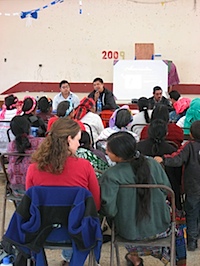 Here’s one of the drop-in attendees who is NOT a midwife, talking to Emily. Our nickname for this lady is the mala honda, or “bad deed”. Every time we see her in town, she asks us for money. One time, she came up to me in the market and told me to give her the broccoli I’d just bought. I respectfully refused, and she said, “¡Que mala honda!” to me and stormed off. Today, though, she didn’t ask us to giver her anything, she just kept annoying Emily: petting and touching her, talking during the presentation, and so forth. She also asked to buy the vest Emily was knitting. No, that “napkin” isn’t for sale, thanks. 😛
Here’s one of the drop-in attendees who is NOT a midwife, talking to Emily. Our nickname for this lady is the mala honda, or “bad deed”. Every time we see her in town, she asks us for money. One time, she came up to me in the market and told me to give her the broccoli I’d just bought. I respectfully refused, and she said, “¡Que mala honda!” to me and stormed off. Today, though, she didn’t ask us to giver her anything, she just kept annoying Emily: petting and touching her, talking during the presentation, and so forth. She also asked to buy the vest Emily was knitting. No, that “napkin” isn’t for sale, thanks. 😛
But for every person that expects us to give them something, there are five that want to give something to us. We must have looked hungry at one point, because one of the midwives handed us each a steaming hot guïskil that she pulled out of her shoulderbag. I am not a big fan, but when I do eat them, they’re usually peeled and boiled in soup. This one still had its spikey rind, which is good for keeping out foodborne pathogens, but not so good for getting poked a bunch when you handle the darn thing.
So, in all, the seminar was a great success. As it wound down on the second day, I told Emily that she’d done a good thing by setting it up. Though it has no immediate, measurable benefits, the long-term implications of this knowledge could make a great change in the quality of life here. And without her and all the connections she’s made in the last year, it never would have happened. We also want to thank Penny Rambacher, the founder of Miracles in Action, for introducing us to the people at ALAS and for supporting their work.
(1) These methods can be used effectively in some instances. Here in Guatemala, gender inequality and machismo make it so women often don’t get to choose when they have sex, and their husbands are less likely to participate in family planning. These methods require that both partners work for the same goal. Additionally, the collar is a tricky device because it depends on a regular menstrual cycle, which is something many women her do not have due to malnutrition and stress levels in the home. So while these methods can work in some cases, they are not very effective here. -Emily
